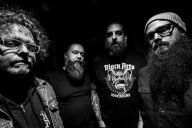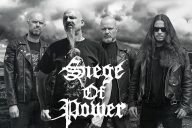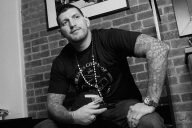UK punk band The Filaments returned with their storming new album Look To The Skies which was released in June. The album demonstrates the vibrant sound the band are known for which incorporates punk, hardcore, ska, dub and oi and just how good it is have them back. We had a chat with vocalist/guitarist Jon Fawkes to talk all about the new album as well as run ins with the alt right, punk as protest music today, playing Glastonbury, how he got into punk rock in the first place and what it means today.
Your new album Look To The Skies is out now. How did the recording of the album go?
The recording was great. We worked with Peter Miles who has produced Cock Sparrer, Argy Bargy, The Skints etc and it was a great experience. He really understands the genre, knows all our reference points and had it all sounding great from the get go. We did the album in seven days and there was a pressure to get it done as opposed to spend ages overthinking everything. We are really happy with the result.
Did you want to capture the incendiary energy of your live show when recording the album and do you think that you succeeded?
We recorded bass drums and guitar live, and think you do get a sense of our on stage energy coming through. One thing that made the process more interesting though was that we had Fran from Inner Terrestrials play bass for half the record, and it was fun to bounce off the different vibes that a great player like that brings.
The albums starts with the explosive and brilliant sentiment of Fuck The “Alt” Right. It’s awesome that you and many other bands are taking a stand against the worrying rise of the alt right. Was this statement of intent important for you to start the album with?
Absolutely. That song was written to be about as unsubtle as it could be. Lyrically it’s on the nose, no room for interpretation, and musically I wanted it to be a short sharp punch to the face.
Have you ever had any trouble with the alt right at any of your gigs and how did you deal with such an issue arising?
Obviously our colours at this stage are nailed to the mast. We’ve never been attacked at shows by infiltrating fash. We were once threatened by nationalists trying to get a firm down to one of our shows on a football hooligan forum, but that was shut down by some connected friends of ours, and we also had our van smashed in when we called out a dodgy skinhead band who played before us at a show many years ago. Nothing too drastic.
Do you think that punk is still the most prominent type of music that still has a big protest meaning to it?
No. It’s not as relevant to large amounts of the youth as other genres. When Stormzy called out the Tories for Grenfell at the Brit awards it gave me goosebumps. There’s plenty of music making waves and saying political stuff. Punk plays a part in that, but I think hip hop and grime have a greater potential to get into peoples heads.
Do you think you can still make a stand and a difference with music?
Absolutely, music got me interested into politics, and was an introduction to ideas I wasn’t being taught in school or at home. Though there are more and more ways of communicating these days online, blogs and YouTube etc which didn’t exist some time ago, I think music continues to be an important way of getting ideas out, and can still get into peoples heads in ways other mediums can’t.
The album is vibrant as well as diverse, from Living In The Crosshairs to Underdogs to Killing Machine. Is it always your intention to mix up all of your influences into one big melting point to create The Filaments sound?
I think we have always been influenced by lots of different styles of music. Perhaps in the early days everything sounded a bit more mashed together because we had less understanding of our influences, but as we have become better players, we have been able to master the sounds we aspire to a little more authentically. I’m a fan of all sorts of music, punk, folk, country, reggae, rockney, hardcore, classical… it all goes into the mix somewhere!
Who are your biggest influences as a band?
I would say when we first started Rancid and all the Hellcat Records bands were our big influences. These days, I would say it’s broader. Mike is into a lot of Scandinavian rock, I listen to a lot of folk, but we will never sound like that as I feel our natural home is aggressive punk with melody like Stiff Little Fingers, but embracing the eclecticism of bands that you can’t say only do one thing…like The Clash.
What is your favourite track on the album, if you had to pick one?
I really love the title track look to the skies. I like it structurally, lyrically and think the playing is simple and effective. One of the better punk rock songs I think I’ve written.
How has the album been received so far?
Honestly, that sort of thing is hard to grasp. I’ve o lot seen positive reviews, but you wonder if the people that think you suck would have you in their publication anyway. To be honest I’m far less into the promotion and marketing of records than I am into the creative process. Once one album is made, I’m thinking about the next. Luckily we have the awesome people at Pirates Press records taking care of getting us out there more, and they are really great people to work with.
You had the launch for Look To The Skies at the Underworld in Camden. How did the show go?
The show was great. We had an eclectic line up of friends bands playing, Lions Law, Knuckledust, The Restarts, it was fun. I love playing the Underworld in Camden, it’s part of the punk rock culture, I’ve been going there for almost 20 years watching shows and for me its always great to play.
Did you play much material from the new album?
Yeah, we are playing about half of the record live now, it’s always great to change the set up, especially when you have been playing some of the songs for 15 years!
What is your favourite song to play live?
I love playing BPC and Bastard Coppers. They are upbeat songs that usually get a good crowd reaction, and shows are all about the circle of energy between band and audience. Those two are fun!
That Underworld gig had a fantastic supporting lineup as you mentioned with Knuckledust, The Restarts and Lions Law as well as Gundog and Nasty Bastard. That’s a strong and varied bill. Do you think that is a good indication of where the UK and European punk and hardcore scene is at right now?
Well, Lions Law are obviously French, and for me are one of the best bands in Europe. It was great to get those guys over. The UK scene seems great to me at the mo, I’m enjoying bands like Pizzatramp, Dub Righters and Fire Pit Collective right now.
What new punk and hc bands could you recommend for us to check out?
As above!
You played at the Rebellion festival earlier in August, you must have been looking forward to that?
Ha, it’s been a while since we have played up there but it’s always a great festival. It’s a good knees up and a chance to see old friends. I hope we will be back again.
You’ve played at Rebellion in the past. What does playing the festival mean to you ?
It’s great. I think it’s really been improved over the last five years or so in terms of the layout/facilities and the calibre of lineup. I feel the bookings have been more ambitious and it’s a credit to the festival that it doesn’t rest on its laurels.
Have you got any more live dates planned for the rest of the year?
We play in Manchester and Derby in September plus we have a bunch of Euro shows sorted.
How was the experience of playing Glastonbury a few years back?
Glastonbury was great. It was a nightmare trying to get to the stage, trudging through loads of mud but the gig was fun. Billy Bragg lent us an amp and embarrassingly I think we blew it up accidentally. It was a case of everything turned up to eleven back then in true spinal tap fashion.
You’ve shared the stage with so many great bands from The Casualties to Leftover Crack to Roger Miret & The Disasters. Who had been the best band that you’ve ever played or toured with?
I always loved touring with The Foamers. We seemed to get each other’s bands so well, and it always dealt like we were building something together. There’s obviously so many other great bands but they have a special place in my heart.
The Filaments initially split in 2005 but got back together in 2009. What led to the band breaking up and what got you back together?
I loved to America, we broke up until I moved back to London.
What had you and the rest of the band been up to while the band were having a break?
We kept playing in a load of other bands, Suicide Bid, Black Radio, Beat The Red Light, The 241ers, Flash Light and we got grown up with families and proper jobs and things like that.
How does it feel to still be doing what you’re doing after all these years?
I honestly can’t imagine stopping playing music. It’s just part of us, it’s what we do and as long as it’s fun we will still be doing it.
How did you get into punk in the first place?
I heard Rancids Lets Go when I was 12 and that was that.
What are some of your favourite punk albums ever made?
Stockyard Stoics first record, the Clashs first record, all Rancid up til Indestructible.
What was the first ever punk gig and what are your memories of the experience?
That’s a good question! I don’t actually remember. What I remember from my early punk days was the sense of community around it all. We are still friends with a hell of a lot of people the we met through all this fifteen years ago. There was much more getting messed up back the , and we are less inclined too all that now, but the friendships have remained.
What have been the best punk gigs you have ever seen and what made them so memorable?
The City Invasion all dayers were great in the early 2000s. I think at one stage over 1000 people were out to see a load of mid level punk bands. It was exciting times, a lot of fun was had and there was a real buzz about the under ground punk world. Not in the press or media, just in that it was obviously speaking to people at the time.
The Filaments also have elements of ska/2 tone, dub and oi in your music. Is what makes The Filaments sound so great and amalgamation of all those different styles of music?
I love punk and ska in all its different forms and that is part of our sound. We are comfortable mixing it up, and I think that’s one of the strengths of the band.
Do punk, hardcore, dub, oi and ska mean the same thing to you both in terms of music and attitude?
They do. There are obviously factions within the scene, but to me, it’s about unpretentious real people getting up and having a say on things. It’s all about being unifying, inclusive and progressive to me. Obviously not everyone involved in this scene feels the same however.
What does punk mean to you in 2018?
As above haha!





No Comments